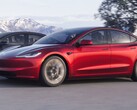President Biden's drastic increase of import duties on anything connected with the Chinese EV and battery industry will also affect local manufacturers like Tesla to an extent.
While the fourfold increase in tariffs on electric cars is mostly symbolic, as no Chinese automaker was under the illusion that they will ever be able to sell their vehicles on the US market directly, the hike in component tariffs hits closer to home.
The Model 3 RWD, for instance, is nominally the cheapest Tesla car before the federal tax credit kicks in. One of the reasons it is sold at this price, however, is that Tesla assembles it in Fremont with iron phosphate LFP batteries that it sources from the world's largest EV battery manufacturers CATL.
Since CATL hails from China, its LFP battery cells now fall under Biden's new tariffs on electric vehicles and components to the tune of 25%, up from 7.5% so far. That huge increase in the cost of cells for the Model 3 will have to be compensated somehow, given that the battery pack is its single most expensive component.
According to one industry analyst, Tesla will most likely eat the production cost difference, rather than raise the price of its cheapest Model 3 in the current "soft" US EV market. With the Model Y tax credit and current 0.99% financing, the Model 3 will be a hard sell with an increased price for the base version. Tesla will either look for other ways to save on production costs, or work with its supplier CATL to drop its prices instead of lowering its margins on the Model 3 further.
Instead of increasing EV prices, the new import barriers before Chinese electric cars and battery materials that the White House is putting into place are more likely to spearhead domestic production, tip analysts.
Ford said that it had given up on the idea to produce a base F-150 Lightning model with LFP batteries, for instance, but not on the planned LFP factory that will use CATL technology but be owned and operated by Ford. "We continue to look at multiple chemistries for the long-term," said Ford. "We remain committed to LFP however we no longer plan to introduce LFP on Lightning due to previously announced updates to our production plans," it confirmed.
Tesla is reportedly also in the planning stages of licensing CATL's technology for an LFP battery factory of its own, but it will allegedly want to go about it even more indirectly than Ford in order to placate the White House and qualify for its generous tax credit incentives on EV batteries made in the US with local materials.
Get the Tesla Universal Wall Connector EV Charger with Dual Plug on Amazon



















